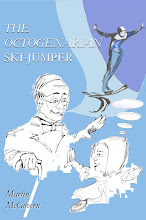I was asked this week what my book is like. Some books fit into a nice neat genre; if you're writing a recipe book, you can say that and people will understand. They can then ask whether the book is about barbecue cooking, or baking, or chinese cuisine. Similarly, if you're writing a novel, it may fit into a genre - science fiction or romance being the most obvious examples, but there are genres for chick lit, gay fiction, historical novels, thrillers - the list goes on.
You have a much harder job on your hands if your book doesn't have a genre. Firstly, you have a harder job to explain what the book is; secondly, if you approach a bookseller (and this applies whether or not you are considering the self-publishing route), they'll want to know which shelf they should put it on. If they can't work out where to put it, they are much less likely to stock it.
My own personal preference when people ask me what type of book I've written is to say 'it's a bog book' - these are books that live in the smallest room in the house. I know that opinions are divided on reading in the toilet. I should perhaps apologise for the use of the word, but in general, in the UK where I live, the word does not offend and the euphemism 'bathroom' is not, frankly, accurate. Perhaps I should suggest that the genre is 'bog books' in the UK and 'bathroom books' elsewhere. One of the advantages of this name is that it does accurately represent where such books may typically be found: and an advantage for the author is that books placed in such a location are much more likely to be read by visitors than those on the bookshelves. And browsing readers are much more likely to buy...
Anyway, here are some of the books that are like The octogenarian Ski-jumper. Or perhaps, in deference to the authors and to the order of publication, I should say that my book is similar to these. I think of these as 'light reference', to distinguish them from heavier reference books such as dictionaries and encyclopedias. At the lighter end of the scale, these books, mine included, would rub shoulders (or perhaps that should be spines) with trivia fact books, lists of humorous quotations, and joke books.
Brewer's Dictionary of Phrase and Fable, by Ebenezer Cobham Brewer
Simply the best dipping book of all time. The only drawback with this delight is that if you try to look something up in it, you are unlikely to find what you want simply because you will be distracted by the enchanting entries on other pages. My hopes for this book are twofold. One, that it will never be out of print; and two, that any electronic version will offer, along with accurate searches of the key phrases, inaccurate ones so that future users of the book can be as entertained as past readers.
Extraordinary Origins of Everyday Things, by Charles Panati
Four hundred or so pages of fascinating information on the origins of words, phrases, and the objects we use every day.
The Oxford Dictionary of Dates, edited by Cyril Leslie Beeching
This book is probably the closest model for mine; information about the birth and death dates, and the dates of key achievements of the famous and infamous.
Who Lies Where, by Michael Kerrigan
Where Are They Buried, by Todd Benoit
These two books have identical themes; Michael Kerrigan's book lists the last resting places of people interred in the UK, and Todd Benoit's book lists those of people interred in the USA. Both are packed with information about those listed. Worth having as you travel around.
The Book of Lists, by David Wallechinsky, Irving Wallace and Amy Wallace
Probably the most eclectic light reference book ever written; I remember getting a copy in the late 1970s and poring over it, by turns fascinated and bewildered by the information it contained. There have been a variety of sequels and different editions over the years.
I didn't know that about England, by Christopher Winn
A recent gift, and a delight - organised by the traditional counties of England, it manages to avoid recycling the things that reasonably informed people do know about places, and entertain with the less travelled byways of England's history.
Subscribe to:
Post Comments (Atom)




No comments:
Post a Comment